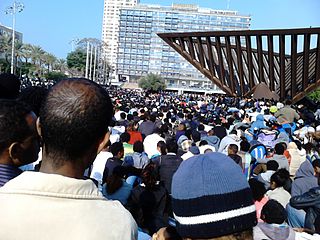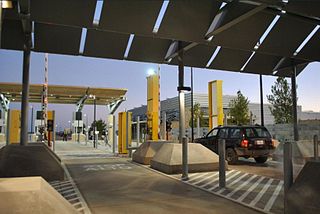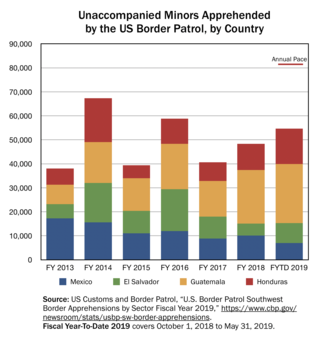Related Research Articles
An asylum seeker is a person who leaves their country of residence, enters another country and applies for asylum in that other country. An asylum seeker is an immigrant who is making a claim to have been forcibly displaced and might have fled their home country because of war or other factors harming them or their family. If their case is accepted, they become considered a refugee. The terms asylum seeker, refugee and illegal immigrant are often confused.

The United States recognizes the right of asylum for individuals seeking protections from persecution, as specified by international and federal law. People who seek protection while outside the U.S. are termed refugees, while people who seek protection from inside the U.S. are termed asylum seekers. Those who are granted asylum are termed asylees.
An unaccompanied minor is a child without the presence of a legal guardian.
VOLAG, sometimes spelled Volag or VolAg, is an abbreviation for "Voluntary Agency". This term refers to any of the nine U.S. private agencies and one state agency that have cooperative agreements with the State Department to provide reception and placement services for refugees arriving in the United States. These agencies use funding from the State Department's Bureau of Population, Refugees, and Migration (PRM) along with self-generated resources to provide refugees with a range of services including sponsorship, initial housing, food and clothing, orientation and counseling. VOLAGs may also contract with the Office of Refugee Resettlement to provide job placement, English language training and other social services. Each of the ten voluntary agencies recognized by the federal government vary significantly in their history, experience, size, denominational affiliation, philosophy, primary clientele, administrative structure, resettlement capacity, and institutionalized resettlement. Of the ten U.S. resettlement agencies, all of them are religiously affiliated or faith-based with the exception of the International Rescue Committee. The tenth VOLAG was added fairly recently in November 2022, when Bethany Christian Services (BCS) was officially designated as its own resettlement agency by the PRM.

The United States government holds tens of thousands of immigrants in detention under the control of Customs and Border Protection and the Immigration and Customs Enforcement (ICE). Immigrants are detained for unlawful entry to the United States, when their claims for asylum are received, and in the process of deportation and removal from the country. During Fiscal Year 2018, 396,448 people were booked into ICE custody: 242,778 of whom were detained by CBP and 153,670 by ICE's own enforcement operations. A daily average of 42,188 immigrants were held by ICE in that year. In addition, over twelve thousand immigrant children are housed by facilities under the supervision of the Office of Refugee Resettlement's program for Unaccompanied Alien Children. Prior to referral to these other agencies, the CBP holds immigrants at processing centers; between mid-May and mid-June 2019, it held between 14,000 and 18,000 immigrants.

African immigration to Israel is the international movement to Israel from Africa of people that are not natives or do not possess Israeli citizenship in order to settle or reside there. This phenomenon began in the second half of the 2000s, when a large number of people from Africa entered Israel, mainly through the then-lightly fenced border between Israel and Egypt in the Sinai Peninsula. According to the data of the Israeli Interior Ministry, 26,635 people arrived illegally in this way by July 2010, and over 55,000 by January 2012. In an attempt to curb the influx, Israel constructed the Egypt–Israel barrier. Since its completion in December 2013, the barrier has almost completely stopped the immigration of Africans into Israel across the Sinai border.
The Office of Refugee Resettlement (ORR) is a program of the Administration for Children and Families, an office within the United States Department of Health and Human Services, created with the passing of the United States Refugee Act of 1980. The Office of Refugee Resettlement offers support for refugees seeking safe haven within the United States, including victims of human trafficking, those seeking asylum from persecution, survivors of torture and war, and unaccompanied alien children. The mission and purpose of the Office of Refugee Resettlement is to assist in the relocation process and provide needed services to individuals granted asylum within the United States.

The Marcelino Serna Port of Entry is a crossing of the United States–Mexico border. It opened on November 17, 2014, replacing the nearby Fabens Port of Entry. The crossing is built around the Tornillo–Guadalupe International Bridge about 1,800 feet (550 m) west of the previous two-lane Fabens–Caseta International Bridge and can accommodate vehicular, pedestrian, and commercial traffic. The U.S. Customs and Border Protection (CBP) facility at the crossing served as the site for the Tornillo tent city, which housed as many as 2,800 detained migrant youths from June 2018 to January 2019. As of July 2019, a 2,500-bed holding facility for adult migrants is under construction at the site.

The 2014 American immigration crisis was a surge in unaccompanied children and women from the Northern Triangle of Central America (NTCA) seeking entrance to the United States in 2014. According to U.S. law, an unaccompanied alien child refers to a person under 18 years of age, who has no lawful immigration status in the U.S., and who does not have a legal guardian to provide physical custody and care.
Third country resettlement or refugee resettlement is, according to the UNHCR, one of three durable solutions for refugees who fled their home country. Resettled refugees have the right to reside long-term or permanent in the country of resettlement and may also have the right to become citizens of that country.
Casa Padre is a shelter for unaccompanied or separated immigrant minors in custody of the U.S. Office of Refugee Resettlement, a division of Health & Human Services, located in Brownsville, Texas. The site opened in March 2017, and is still housing children in 2022. The building was formerly a Walmart store. The center is run by the nonprofit group Southwest Key Programs under contract from the federal government. Casa Padre is the largest licensed childcare facility in the United States, housing approximately 1,500 youths. The former Walmart store houses boys ranging from ages 10 to 17. According to the Internal Revenue Service, the group houses approximately 5,129 immigrant children in the United States, approximately 4 percent of the unaccompanied minors in the United States today.

The United States family separation policy under the Trump administration was presented to the public as a "zero tolerance" approach intended to deter illegal immigration and to encourage tougher legislation. In some cases, families following the legal procedure to apply for asylum at official border crossings were also separated. It was officially adopted across the entire US–Mexico border from April 2018 until June 2018. Under the policy, federal authorities separated children and infants from parents or guardians with whom they had entered the US. The adults were prosecuted and held in federal jails or deported, and the children were placed under the supervision of the US Department of Health and Human Services. More than 5,500 children, including infants, were removed and hundreds have still not been reunited as of August 2022.
Family detention is the detention of multiple family members together in an immigration detention context. In the U.S. they are referred to as family detention camps,family detention centers, or family detention facilities.

Unaccompanied Alien Children is a United States government classification for children in immigration custody and the name of a program operated by the Office of Refugee Resettlement to house and care for them. The term designates unaccompanied minors who are aliens, typically those who have been apprehended outside of a legal port of entry or judged inadmissible upon their entry.

The Trump administration has detained migrants attempting to enter the United States at the United States–Mexico border. Government reports from the Department of Homeland Security Office of Inspector General in May 2019 and July 2019 found that migrants had been detained under conditions that failed federal standards. These conditions have included prolonged detention, overcrowding, and poor hygiene and food standards.
The city of Baltimore, Maryland includes a small Syrian population. The Syrian-American community is centered in East Baltimore. While Syrian-Americans have had a presence in Baltimore for over a century, most Syrians in Baltimore are recent immigrants and refugees who have fled the Syrian Civil War.

Krishanti O'Mara Vignarajah is a Marshall Scholar and an immigration advocate serving as President and CEO of Global Refuge. Previously, Vignarajah served as Policy Director to former First Lady Michelle Obama.

Joe Biden's immigration policy is primarily based on reversing many of the immigration policies of the previous Trump administration. During his first day in office, Biden reversed many of Trump's policies on immigration, such as halting the construction of the Mexican border wall, ending Trump's travel ban restricting travel from 14 countries, and an executive order to reaffirm protections for DACA recipients. The Biden administration and Department of Homeland Security, under leadership of Alejandro Mayorkas, dramatically reined in deportation practices of Immigration and Customs Enforcement (ICE), prioritizing national security and violent crime concerns over petty and nonviolent offenses. However, Biden has also faced criticism for extending Title 42, a Trump administration border restriction that arose due to the COVID-19 pandemic, as well as restarting the use of expediting families in Central America, which can cause families to be sent back in weeks, compared to years for an average immigration case. In the fiscal year 2021, the US Border Patrol confirmed more than 1.6 million encounters with migrants along the US-Mexico border, more than quadruple the number in the previous fiscal year and the largest annual total on record. In January 2023, Biden announced a program to strengthen the admission of immigrants from Cuba, Haiti, Nicaragua, and Venezuela, while at the same time his administration will crack down on those who fail to use the plan's legal pathway and strengthen border security. In May 2023, the Biden Administration approved sending 1,500 more troops to the U.S.-Mexico border following Title 42's expiration.
The Center for Human Rights and Constitutional Law (CHRCL) is a nonprofit organization based in Los Angeles, California. It was founded in 1983 by lawyer Peter Schey with the mission of protecting and furthering the human and civil rights of immigrants, refugees, and other marginalized communities through nationwide class action litigation and activism.
References
- ↑ Influence Watch
- ↑ LIRS (2024-01-17). "LIRS Rebrands as Global Refuge | Press Release". Global Refuge. Retrieved 2024-01-17.
- ↑ "Voluntary Agencies". U.S. Department of Health and Human Services - Administration for Children and Families. Retrieved July 17, 2019.
- ↑ "About Unaccompanied Refugee Minors". Office of Refugee Resettlement; Administration for Children and Families. Retrieved July 17, 2019.
- ↑ Sneed, Tierney (October 30, 2014). "Immigrant Detention Centers in Texas, New Mexico Have Old Problems, Report Finds". U.S. News & World Report . Retrieved July 17, 2019.
- ↑ "'Locking Up Family Values, Again' Report". Lutheran Immigration and Refugee Service. January 24, 2013. Retrieved September 3, 2015.
- ↑ Solberg, Richard W. (1992). Open Doors the Story of Lutherans Resettling Refugees. St. Louis: Concordia Publishing House.
- ↑ Bouman, Stephen Paul; Deffenbaugh, Ralston H. (2009). They Are Us: Lutherans and Immigration. Minneapolis: Augsburg Fortress.
- ↑ Oleaga, Michael (October 30, 2014). "Immigration Reform Update: Immigrant Rights Groups Call for Closing Artesia, Karnes Detention Centers as Report Details 'Inhumane' Conditions : US News". Latin Post. Retrieved July 17, 2019.
- ↑ Hartke, Linda (April 24, 2012). "See It, Say It: The Supreme Court Should Strike Down SB 1070". Sojourners. Retrieved July 17, 2019.
- ↑ Aziz, Saharf; Roman, Ediberto (June 21, 2012). "If High Court Upholds Arizona's SB 1070, Priests and Rabbis Could Be Prosecuted for Providing Humanitarian Aid". TruthOut. Retrieved July 17, 2019.
- ↑ "Church Partners". Lutheran Immigration and Refugee Service. Retrieved January 9, 2024.
- ↑ "LIRS Appoints Krish O'Mara Vignarajah as President and CEO: Choice Represents a New Generation of Leadership". Lutheran Immigration and Refugee Service. February 13, 2019. Retrieved February 13, 2019.